Jeremy Lin: Breaking Down His 2012-13 NBA Season With Houston Rockets (Video)
All in all, Jeremy Lin's 2012-13 NBA season as a Houston Rocket was pretty much a rollercoaster.
There were ups, there were downs, there were moments that thrilled and moments that made fans shake their heads. For the start of the year, he was a player who had no idea how to fit into a new offense that featured a superstar in James Harden and new teammates with a new coach after coming over from New York in the offseason. And it all translated into Lin's dreadful 37.3 percent shooting struggles for November--and a poor 26.3 percent from three-point range--where he averaged 10.2 points and 6.4 assists for the month.
Then he showed encouraging signs of life in December with a 38-point gem against the eventual Southwest Division champion San Antonio Spurs and a hot stretch in mid-December highlighted by his 22-point, 8 assist return to New York in a dominating 109-96 Rockets win at the birthplace of "Linsanity."
Lin had an encouraging January where he shot 42.2 percent from the field for 12.7 points and 5.5 assists for the month and he started making the most of his 11.8 shot attempts in February, which translated into a strong 14.5 points and 43.8 percent shooting.
However, he still fell into an off pattern of lacking consistency, scoring double digit figures for several games, then going cold with his shooting touch. Having to learn to play off the ball while Harden and Chandler Parsons took most of the shots for Houston, it was a learning process for Lin as he had to adapt to being the kind of point guard that could run a fast-paced, ever-moving offensive system that the Rockets used to run opponents ragged and rack up tons of points.
Then, came March and April.
Lin started stabilizing in his role and became more focused in being a facilitator for Houston. Yet more importantly, his shot was falling at a red-hot level. For March, Lin shot a deadly 48.2 percent from the field and 40 percent from three-point range. Over the last nine games in April, and during times when the team needed scoring most with Harden and Parsons on the shelf due to injury, Lin averaged season-highs with 17.3 points with 6.9 assists, shooting 44 percent from the field while at it as the Rockets finished with the eighth seed in the playoffs. He was starting to look pretty good entering his first-ever NBA playoffs series, shooting well, facilitating scoring for teammates, keeping the Rockets in their offensive sets and starting to look more confident.
Unfortunately, Lin's foray into the postseason was one to forget, Lin shooting only 1-for-7 in Game 1 and 3-for 7 in Game 2, where he suffered a chest bruise from Oklahoma City Thunder defender Thabo Sefolosha that knocked him out of Games 4 and 5 and dramatically reduced his ability to shoot the ball. Over the four games he played with the Rockets in the playoffs, Lin scored only 4.0 points and shot only 25 percent from the field-including an anemic 16.7 percent from three-point range-in a series where his replacement, Patrick Beverley, exploded as a surprising revelation while the Rockets fell in six games after fighting valiantly.
However, Lin's post-series message on Twitter last week remained optimistic, yet critical of himself.
"THANKS for the support through the season! Tough way to go out and i must play/become much better...still the future is bright!! #RedNation," he tweeted.
In a nutshell, that summed up the entirety of his season--a little rough, but promising, with good things to come.
There were rough patches and Lin showed some flaws where he had to improve. He still needs to learn patience in setting up plays. There were times, particularly during the playoffs, where he seemed to rush things too fast against OKC on offense, making him prone to throwing bad passes that resulted in turnovers. While the Rockets pride themselves on speed, controlling the basketball is a critical facet of his game that Lin is still fine-tuning, one that will come with time and practice. While his defense has improved over the course of time, it could still improve if Lin learns to work better around screens and use his speed and youth to shadow his opponents a little better. And he'll have to work on his shooting, particularly picking his spots better and improving his jump shot. Lin can drive the ball as good as anyone in the NBA, but if he can work on his shot selection a little more, that could mean a world of difference for him and the Rockets.
And the bright spots? For all the troubles, Lin has emerged as a better player than before. He's shown what he can do when he's the center of the offense in New York under Mike D'Antoni's system, but in Houston, he learned how to play off the ball. Lin's shown that given time, he can adapt to the roles that are asked of him. He can be the guy who is charged with keeping the offense on point as the floor general while directing traffic as Harden and Parsons or others get involved, while at the same time, he can be an offensive weapon when he is counted on in moments where Harden or Parsons are out of the equation.
He's shown that he is durable, playing an "iron man"-like full 82-game schedule for the season, his first serious injury only taking place during the playoffs with the chest contusion. And while he's gotten knocked around quite a bit during the season, he's shown toughness in working through cuts in his head requiring stitches, ankle sprains and hard whacks when driving to the hole. All of those are the trademarks of a starting NBA point guard.
All in all, grading Lin's first season with the Houston Rockets, it would have to be a "B." There is room for improvement, but the building blocks are there, and he has come a long way in silencing critics who thought he could not make it as a full-time starter for the Rockets. And if Lin continues to work at getting better during the offseason, as all great players do, then the sky's the limit in 2013-14 for the wildly-popular point guard--and maybe an All-Star Game berth could be part of that horizon.


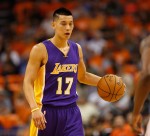
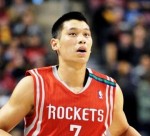
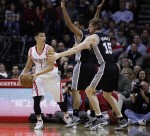
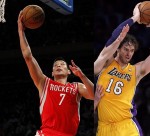








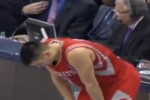
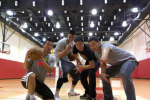
![Jeremy Lin Explodes For 45 pts In Pro-Am Basketball Game In San Francisco [VIDEOS]](https://1544034087.rsc.cdn77.org/data/thumbs/full/23325/400/224/50/40/image.jpg)

Join the Conversation